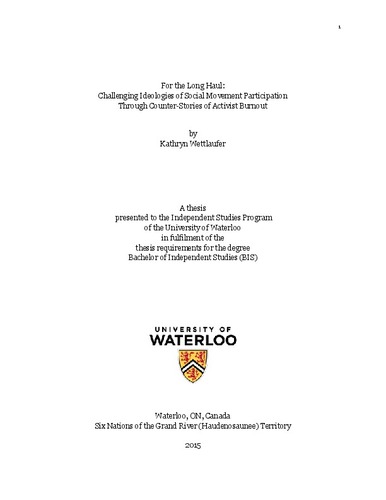| dc.contributor.author | Wettlauffer, Kathryn | |
| dc.date.accessioned | 2016-09-08 19:50:58 (GMT) | |
| dc.date.available | 2016-09-08 19:50:58 (GMT) | |
| dc.date.issued | 2015 | |
| dc.identifier.uri | http://hdl.handle.net/10012/10821 | |
| dc.description | The Independent Studies program closed in 2016. This thesis was one of 25 accepted by Library for long-term preservation and presentation in UWSpace. | en |
| dc.description.abstract | It is a widely accepted truth, in the academic and activist literature alike, that burnout jeopardizes the sustainability of social movements and their actors. More disputable is whether its cause, or blame, lies in collective pressures or personal choices. This thesis takes up critical theory to develop a narrative inquiry into the dynamics between the two, in pursuit of answers to more complex questions about the origins of burnout: What ideologies of social movement participation dominate activist spaces? How do they manifest in subcultural norms and practices? And how do participants themselves navigate or negotiate these collective expectations, in order to “do activism” or do activism differently, in ways that are personally (un)sustainable? Narrative analysis was conducted using data collected during life story interviews with ten social and environmental justice activists from across Southern Ontario. Four distinct yet intersecting “ideologies” were discerned as forces shaping social movement participation within this region: an ideology of what activism is? an ideology of activist spaces as (anti)oppressive? an ideology of community relationships? and an ideology of how commitment is experienced or proven. These “activist ideologies” are also traced back to their roots in key ideologies that dominate western society more broadly, demonstrating an application of Althusser’s theory of the ideological state apparatus and how the “trickledown effect” of oppressive relations—even amongst progressives and radicals—may be interrupted or subverted. This theoretical analysis is complemented by a creative analytic theatre script crafted from the original research data. Its purpose is twofold: While offering the reader a more engaging representation of that data in the context of this thesis, “the play” is also designed for use in social movement spaces as a tool to both encourage the sharing of activists’ own burnout experiences and spark deeper, more strategic discussions of long-term social movement sustainability. | en |
| dc.language.iso | en | en |
| dc.publisher | University of Waterloo | en |
| dc.relation.ispartofseries | IS 410, Honours Thesis Phase I | en |
| dc.relation.ispartofseries | IS 420, Honours Thesis Phase II | en |
| dc.subject | social activism | en |
| dc.subject | community relationships | en |
| dc.subject | activist spaces | en |
| dc.subject | commitment | en |
| dc.subject | burnout (psychology) | en |
| dc.subject | stress | en |
| dc.subject | mental health | en |
| dc.title | For the Long Haul: Challenging Ideologies of Social Movement Participation through Counter-stories of Activist Burnout | en |
| dc.type | Bachelor Thesis | en |
| uws-etd.degree.department | Independent Studies | en |
| uws-etd.degree.discipline | Independent Studies | en |
| uws-etd.degree | Bachelor of Independent Studies | en |
| uws.contributor.advisor | Berbary, Lisbeth | |
| uws.contributor.advisor | Havitz, Mark | |
| uws.contributor.affiliation1 | Faculty of Arts | en |
| uws.published.city | Waterloo | en |
| uws.published.country | Canada | en |
| uws.published.province | Ontario | en |
| uws.typeOfResource | Text | en |
| uws.peerReviewStatus | Unreviewed | en |
| uws.scholarLevel | Undergraduate | en |

